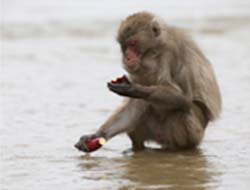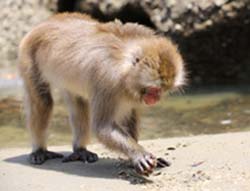
2017/9/24(ж—Ҙ)гҖҖ第41еӣһдә¬еӨ§гғўгғігӮӯгғјж—ҘжӣңгӮөгғӯгғі
гҖҢгғӢгғӣгғігӮ¶гғ«гҒ®ж–ҮеҢ–гҖҚ гӮҜгғ¬гӮўгғ»гғҜгғҲгӮҪгғі е…Ҳз”ҹ
гҖҢCulture in Japanese monkeysгҖҚгҖҖDr. Claire Watson
гҖҢгғӢгғӣгғігӮ¶гғ«гҒ®ж–ҮеҢ–гҖҚ гӮҜгғ¬гӮўгғ»гғҜгғҲгӮҪгғі е…Ҳз”ҹ
гҖҢCulture in Japanese monkeysгҖҚгҖҖDr. Claire Watson
|
в– ж—ҘжҷӮпјҡ2017/9/24(ж—Ҙ)гҖҖ12:30пҪһ13:15 в– и¬ӣеё«пјҡ гӮҜгғ¬гӮўгғ»гғҜгғҲгӮҪгғі е…Ҳз”ҹпјҲдә¬йғҪеӨ§еӯҰйңҠй•·йЎһз ”з©¶жүҖгғ»еӣҪйҡӣе…ұеҗҢе…Ҳз«Ҝз ”з©¶гӮ»гғігӮҝгғјгғ»з ”究員пјү Dr.Claire Watson(Postdoctoral Research Fellow, Primate Research Institute, Kyoto University) вҖ»гғ—гғӯгғ•гӮЈгғјгғ«гҒҜгҒ“гҒЎгӮү в– еҶ…е®№пјҡ гҒ“гӮҢгҒҫгҒ§ж–ҮеҢ–гҒҜдәәй–“гҒ«зү№жңүгҒӘгӮӮгҒ®гҒ гҒЁиҖғгҒҲгӮүгӮҢгҒҰгҒҚгҒҫгҒ—гҒҹгҒҢгҖҒгғ’гғҲд»ҘеӨ–гҒ®еӢ•зү©гӮӮж–ҮеҢ–зҡ„иЎҢеӢ•гӮ’жҢҒгҒӨгҒ“гҒЁгҒҢгӮҸгҒӢгҒЈгҒҰгҒ„гҒҫгҒҷгҖӮ ж—Ҙжң¬гҒ®з ”究иҖ…гҒҹгҒЎгҒҢдё–з•ҢгҒ«е…ҲгҒҢгҒ‘гҒҰеӢ•зү©гҒ§ж–ҮеҢ–зҡ„иЎҢеӢ•гҒЁе‘јгҒ№гҒқгҒҶгҒӘгӮӮгҒ®гӮ’иҰӢгҒӨгҒ‘гҒҰе ұе‘ҠгҒ—гҒҰгҒҚгҒҫгҒ—гҒҹгҖӮ гҒқгӮҢгҒҢгғӢгғӣгғігӮ¶гғ«гҒ§гҒҝгӮүгӮҢгӮӢгӮӨгғўжҙ—гҒ„гҒӘгҒ©гҒ®иЎҢеӢ•гҒ§гҒҷгҖӮ ж–ҮеҢ–зҡ„иЎҢеӢ•гҒЁгҒҜе‘ЁгӮҠгҒ®д»–иҖ…гҒӢгӮүеӯҰгҒ¶гҒ“гҒЁгӮ’гҒ„гҒ„гҒҫгҒҷгҖӮдәәй–“гҒҜдҪҸгӮҖеӣҪгӮ„ең°еҹҹгҒ«гӮҲгҒЈгҒҰз•°гҒӘгӮӢж–ҮеҢ–гӮ’жҢҒгҒЈгҒҰгҒ„гҒҫгҒҷгҖӮ еҗҢгҒҳгӮҲгҒҶгҒ«гҖҒгҒӮгӮӢйӣҶеӣЈгҒ®гӮөгғ«гҒ§гҒҝгӮүгӮҢгӮӢж–ҮеҢ–зҡ„иЎҢеӢ•гҒҢгҒ»гҒӢгҒ®йӣҶеӣЈгҒ§гҒҜгҒҝгӮүгӮҢгҒӘгҒ„гҒЁгҒ„гҒҶгҒ“гҒЁгҒҢгҒӮгӮҠгҒҫгҒҷгҖӮ жң¬и¬ӣжј”гҒ§гҒҜгҖҒгҒҹгҒҸгҒ•гӮ“гҒ®еҶҷзңҹгӮ„гғ“гғҮгӮӘгӮ’дҪҝгҒЈгҒҰгҖҒж—Ҙжң¬гҒ®гҒ„гӮҚгҒ„гӮҚгҒӘең°еҹҹгҒ§иҰіеҜҹгҒ•гӮҢгҒҹгғӢгғӣгғігӮ¶гғ«гҒ®ж–ҮеҢ–зҡ„иЎҢеӢ•гӮ’гҒ”зҙ№д»ӢгҒ—гҒҫгҒҷгҖӮ пјҲвҖ»жң¬и¬ӣжј”гҒҜиӢұиӘһгҒ§гҒҠгҒ“гҒӘгӮҸгӮҢгҒҫгҒҷгҒҢгҖҒйҒ©е®ңгҖҒйҖҡиЁігӮ’гҒҜгҒ•гҒҝгҒҫгҒҷгҖӮеҚ”еҠӣпјҡдә¬йғҪеӨ§еӯҰйңҠй•·йЎһз ”з©¶жүҖгғ»е·қеҸЈгӮҶгӮҠпјү It used to be thought that culture was a unique feature of humans. Nowwe know that nonhuman animals also have traditions. Japanese researchers were among the first in the world to identify and report possible traditions in an animal: the Japanese macaque. Such traditions included washing sweet potatoes in water. Traditions are behaviours that you learn from others around you. Humans living in different countries and regions have different traditions. Similarly, some groups of monkeys have certain traditions not seen in othergroups. In this talk I will describe the variety of different traditions observed in this species at different sites across Japan. I will use many photos and videos to illustrate the topic. в– еҜҫиұЎе№ҙйҪўпјҡе°ҸеӯҰж Ўй«ҳеӯҰе№ҙд»ҘдёҠ вҖ»гҒ©гҒӘгҒҹгҒ§гӮӮгҒ”еҸӮеҠ гҒ„гҒҹгҒ гҒ‘гҒҫгҒҷгҒҢгҖҒйӣЈжҳ“еәҰзӯүгҒҜдёҠиЁҳгҒ«еҗҲгӮҸгҒӣгҒҰйҖІиЎҢгҒ„гҒҹгҒ—гҒҫгҒҷ |
   |



е–¶жҘӯжЎҲеҶ…
еҸӢгҒ®дјҡ
ең’еҶ…гғһгғғгғ—гғ»ж–ҪиЁӯзҙ№д»Ӣ
гӮўгӮҜгӮ»гӮ№

еӢ•зү©ең’гӮӨгғҷгғігғҲ
гғўгғігӮӯгғјж—ҘжӣңгӮөгғӯгғі
гғҹгғҘгғјгӮёгӮўгғ гғҲгғјгӮҜ
зү№еҲҘеұ•
еҶҷз”ҹеӨ§дјҡ

еӯҰзҝ’еҲ©з”ЁгҒ®гҒ”жЎҲеҶ…
гҖҖеӣЈдҪ“еҲ©з”Ёгғ»е®ҹзҝ’гғ»з ”дҝ®гҒӘгҒ©
гғўгғігӮӯгғјгӮӯгғЈгғігғ‘гӮ№
гғ—гғӘгғһгғјгғҶгӮ№з ”究дјҡ
гҒҠгҒҶгҒЎгҒ©гҒҶгҒ¶гҒӨгҒҲгӮ“
з ”з©¶е®Ө
еҚҡзү©йӨЁиіҮж–ҷ
йҖЈжҗәз ”з©¶
еұӢд№…еі¶з ”дҝ®жүҖ
WebйңҠй•·йЎһеӣій‘‘
йңҠй•·йЎһе’ҢеҗҚгғӘгӮ№гғҲ
еӣҪйҡӣеӯҰиЎ“иӘҢгҖҢPrimatesгҖҚ
йӣ‘иӘҢгҖҢгғўгғігӮӯгғјгҖҚ
ж–°JMCйҖҡдҝЎ
жӯҙеҸІгғ»е®ҡж¬ҫгғ»е№ҙе ұгҒӘгҒ©
гӮ№гӮҝгғғгғ•зҙ№д»Ӣ
е…Ёй ӯиӘ•з”ҹж—ҘгӮ«гғ¬гғігғҖгғј
жұӮдәәжғ…е ұ
еҸ–жқҗзӯүгҒ®гҒҠе•ҸеҗҲгҒӣ
гӮөгӮӨгғҲеҲ©з”ЁиҰҸе®ҡ
| вҖ»ж—Ҙжң¬гҒ®еӢ•зү©ең’зӯүгҒ§йЈјиӮІгҒ•гӮҢгҒҰгҒ„гӮӢйңҠй•·йЎһгҒ®зЁ®ж•°гҒҜ102зЁ®йЎһгҒ§гҒҷгҖӮпјҲ2015е№ҙ3жңҲ31ж—ҘжҷӮзӮ№гҖҒGAINиӘҝгҒ№гҖӮзЁ®й–“йӣ‘зЁ®гҒқгҒ®д»–гҒ®еҲҶйЎһдёҚжҳҺгҒӘгӮӮгҒ®гҒҜйҷӨгҒҸгҖӮпјү |

е…¬зӣҠиІЎеӣЈжі•дәә ж—Ҙжң¬гғўгғігӮӯгғјгӮ»гғігӮҝгғј
гҖ’484-0081 ж„ӣзҹҘзңҢзҠ¬еұұеёӮзҠ¬еұұе®ҳжһ—26з•Әең°гҖҖTELпјҡ0568-61-2327гҖҖFAXпјҡ0568-62-6823
еӢ•зү©еҸ–жүұжҘӯпјҡе…¬зӣҠиІЎеӣЈжі•дәәж—Ҙжң¬гғўгғігӮӯгғјгӮ»гғігӮҝгғјгҖҖж„ӣзҹҘзңҢзҠ¬еұұеёӮеӨ§еӯ—зҠ¬еұұеӯ—е®ҳжһ—26з•Әең°
жҘӯзЁ®:еұ•зӨәгҖҖеӢ•е°ҫ第510еҸ·гҖҖжҘӯзЁ®пјҡиІёеҮәгҒ—гҖҖеӢ•е°ҫ第509еҸ·гҖҖзҷ»йҢІ:е№іжҲҗ19е№ҙ5жңҲ31ж—ҘгҖҖжңүеҠ№:д»Өе’Ң9е№ҙ5жңҲ30ж—ҘгҖҖеҸ–жүұиІ¬д»»иҖ…:з¶ҝиІ«е®ҸеҸІжң—
гҖ’484-0081 ж„ӣзҹҘзңҢзҠ¬еұұеёӮзҠ¬еұұе®ҳжһ—26з•Әең°гҖҖTELпјҡ0568-61-2327гҖҖFAXпјҡ0568-62-6823
еӢ•зү©еҸ–жүұжҘӯпјҡе…¬зӣҠиІЎеӣЈжі•дәәж—Ҙжң¬гғўгғігӮӯгғјгӮ»гғігӮҝгғјгҖҖж„ӣзҹҘзңҢзҠ¬еұұеёӮеӨ§еӯ—зҠ¬еұұеӯ—е®ҳжһ—26з•Әең°
жҘӯзЁ®:еұ•зӨәгҖҖеӢ•е°ҫ第510еҸ·гҖҖжҘӯзЁ®пјҡиІёеҮәгҒ—гҖҖеӢ•е°ҫ第509еҸ·гҖҖзҷ»йҢІ:е№іжҲҗ19е№ҙ5жңҲ31ж—ҘгҖҖжңүеҠ№:д»Өе’Ң9е№ҙ5жңҲ30ж—ҘгҖҖеҸ–жүұиІ¬д»»иҖ…:з¶ҝиІ«е®ҸеҸІжң—











